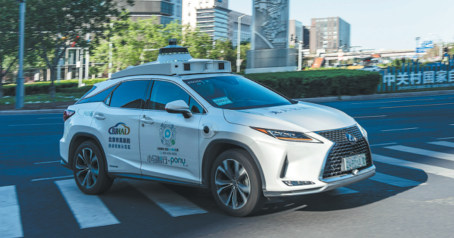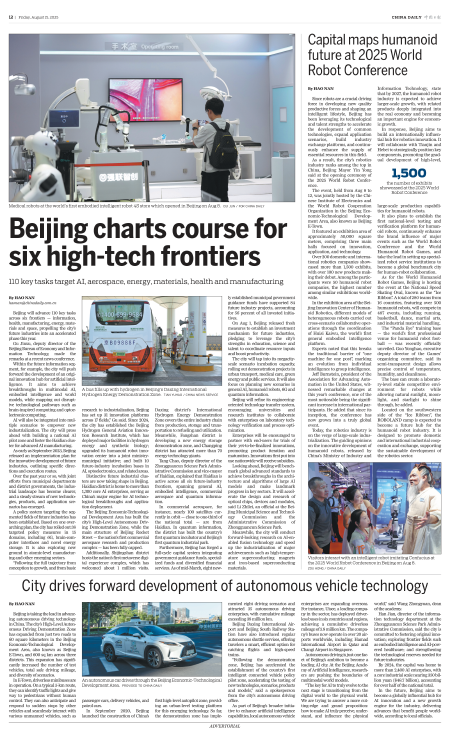
An autonomous car drives through the Beijing Economic-Technological Development Area.
Beijing is taking the lead in advancing autonomous driving technology in China. The city's High-Level Autonomous Driving Demonstration Zone has expanded from just two roads to 60 square kilometers in the Beijing Economic-Technological Development Area, also known as Beijing E-Town, and 600 sq km across three districts. This expansion has significantly increased the number of test vehicles, total safe driving mileage, and diversity of scenarios.
In E-Town, driverless minibuses are in operation. On a typical 5-km route, they can identify traffic lights and give way to pedestrians without human control. They can also anticipate and respond to sudden stops by other vehicles and seamlessly interact with various unmanned vehicles, such as passenger cars, delivery vehicles, and patrol cars.
In September 2020, Beijing launched the construction of China's first high-level autopilot zone, providing an urban-level testing platform for this emerging technology. So far, the demonstration zone has implemented eight driving scenarios and attracted 35 autonomous driving enterprises, with cumulative mileage exceeding 38 million km.
Beijing Daxing International Airport and Beijing South Railway Station have also introduced regular autonomous shuttle services, offering travelers a smart, efficient option for catching flights and high-speed trains.
"Following the demonstration zone, Beijing has accelerated the establishment of the country's first intelligent connected vehicle policy pilot zone, accelerating the testing of new technologies, scenarios, products and models," said a spokesperson from the city's autonomous driving office.
As part of Beijing's broader initiative to enhance artificial intelligence capabilities, local autonomous vehicle enterprises are expanding overseas. For instance, Uisee, a leading company in the sector, has deployed driverless buses in six countries and regions, achieving a cumulative driverless mileage of 5.8 million km. The company's buses now operate in over 20 airports worldwide, including Hamad International Airport in Qatar and Changi Airport in Singapore.
Autonomous driving is just one facet of Beijing's ambition to become a leading AI city. At the Beijing Academy of Artificial Intelligence, researchers are pushing the boundaries of multimodal world models.
"The key for AI to truly evolve to the next stage is transitioning from the digital world to the physical world. We are trying to answer a more cutting-edge and grand proposition: how to make AI truly perceive, understand, and influence the physical world," said Wang Zhongyuan, dean of the academy.
Han Jian, director of the information technology department at the Zhongguancun Science Park Administrative Commission, said the city is committed to fostering original innovation; exploring frontier fields such as embodied intelligence and AI-powered healthcare; and strengthening the technological reserves needed for future industries.
By 2024, the capital was home to more than 2,400 AI enterprises, with a core industrial scale nearing 350 billion yuan ($48.7 billion), accounting for over half of the national total.
In the future, Beijing aims to become a globally influential hub for AI innovation and a new growth engine for the industry, delivering advances that benefit people worldwide, according to local officials.

